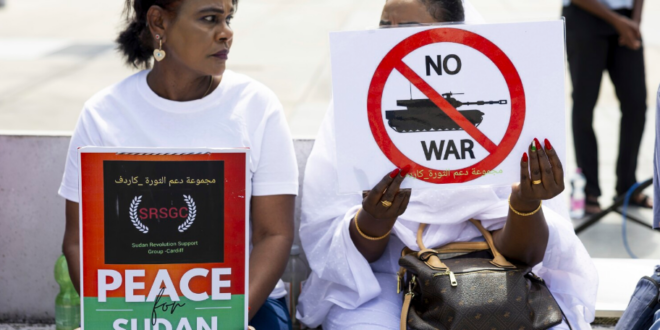Muhamad Yehia
UNITED NATIONS (AP) — The U.S. ambassador to the United Nations announced nearly $203 million in additional humanitarian assistance to Sudan on Thursday but warned that the money is not a “panacea” and urged other countries to fulfill their financial pledges to address what she called “the world’s worst humanitarian crisis.”
World leaders pledged more than $2.1 billion in humanitarian aid for Sudan at a donors conference in Paris in April, but U.S. envoy Linda Thomas-Greenfield said only about a quarter of the promised funds have been received three months later.
The northeastern African country descended into chaos in April 2023 when simmering tensions between the country’s military and a notorious paramilitary group, the Rapid Support Forces, exploded into open fighting in the capital of Khartoum.
The devastating conflict has spread, especially to western Darfur, and has killed more than 14,000 people and wounded 33,000 others, according to the United Nations. It has also created the world’s largest displacement crisis, with more than 11 million people forced to flee their homes
Thomas-Greenfield said Thursday’s contribution raises total U.S. humanitarian assistance to Sudan to $1.6 billion since September 2023, making the United States Sudan’s largest single donor.
“We hope this new round of aid serves as a call to action for others to follow,” she said
The ambassador said the additional $203 million will go toward food supplies, shelters, schools and health services, as well as cash assistance to refugees to help pay their rents. The funds also will help neighboring countries, where over 2 million Sudanese refugees have fled, she said.
The U.S. mission to the U.N. said Thomas-Greenfield briefed U.N. diplomats on the hunger crisis in Sudan, where a record 25 million people face acute food insecurity and 755,000 people face famine in the coming months, according toa recent report by the U.N. global network monitoring the threat of famine
Human rights experts working for the United Nations said both sides have used food and starvation as a weapon of war.
Thomas-Greenfield recalled her visit to a hospital in Chad run by the medical charity Doctors Without Borders: “Children were so weak they lacked the energy to even cry.”
Global humanitarian aid organization Mercy Corps recently estimated that nine in 10 children suffer from life-threatening malnutrition in central Darfur, where the World Food Program has delivered aid in recent months after facing challenges negotiating access with armed groups.
Thomas-Greenfield said the U.S. will continue diplomatic efforts to hold perpetrators of the violence accountable and reach a peace agreement between the warring parties.
Last week, representatives of the two sides arrived in Geneva for separate talks with the U.N. secretary-general’s personal envoy, Ramtane Lamamra, about protecting civilians through possible local cease-fires.
U.N. spokesman Stephane Dujarric said late Thursday that Lamamra and his team have continued engaging separately with each of the delegations throughout this week on humanitarian assistance and protection of civilians. He said the talks are expected to conclude Friday.
They marked the second attempt at deescalation after talks in Saudi Arabia’s port city of Jeddah broke down at the end of last year.
 موقع وجه أفريقيا موقع وجه أفريقيا هو موقع مهتم بمتابعة التطورات في القارة الأفريقية
موقع وجه أفريقيا موقع وجه أفريقيا هو موقع مهتم بمتابعة التطورات في القارة الأفريقية


